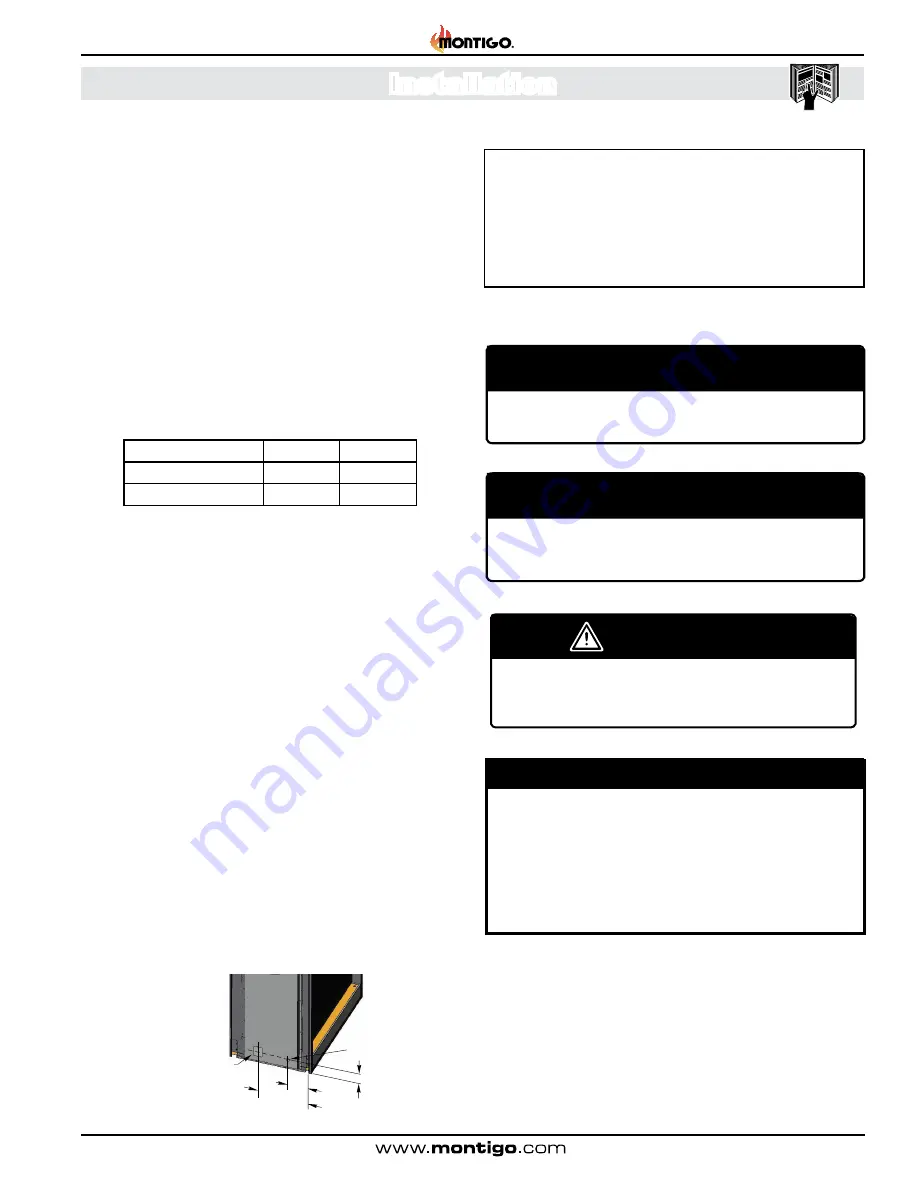
H*38DF ST Indoor Gas Fireplace
Page 21
XG0207 - 150204.1
Installation
Section 5: Installing the Gas Line
Ø 1 3/4”
16 1/4”
8 1/4”
2 3/4”
Gas Access 3”x 2”
Rectangle Opening
Section 5-1: FUEL CONVERSION
Verify that your fireplace is compatible with your available gas
type. (Natural Gas or Propane shown by "N" or "L" in your
model number
If gas type is not compatible, contact your local Montigo
representative.
Conversion kits must be installed by a qualified service technician.
Section 5-2: GAS PRESSURE
Optimum appliance performance requires proper input pressures.
Gas line sizing requirements will be determined in ANSI Z221.3
National Fuel Gas Code in the USA and CAN/CGA B149 in
Canada.
Pressure requirements are:
Gas Pressure
Natural Gas
Propane
Minimum inlet pressure
5.5in. w.c.
11in. w.c.
Manifold pressure
3.5in. w.c.
10in. w.c.
Note:
After gas line is connected,
each
appliance connection
,
valve and valve train
must be checked while under normal
operating pressure with either a liquid solution, or leak
detection device, to locate any source of leak. Tighten any
areas where bubbling appears or leak is detected until
bubbling stops completely or leak is no longer detected.
DO NOT use a flame of any kind to test for leaks.
The manifold outlet pressure is set from the factory to the
appropriate pressure but should be verified.
To check pressures, control valves have a provision to remove
a 1/8” N.PT. plug to be fitted with a hose barb.
Montigo requires a service shut off valve be located in an
accessible location to isolate the gas supply.
Only install gas shut-off valves approved for use by the state,
province, or other governing body in which the fireplace is being
installed.
Section 5-3: GAS CONNECTION
See
Figure 21
below for location of gas line access.
Flexible gas connectors must not exceed 3 feet in length, unless
allowable within local regulations.
Connect incoming gas line to the 1/2"or 3/8" gas inlet port.
Purge all air out of gas line.
Check appliance connection, valve and valve train under normal
operating pressure with a commercially available leak check
solution.
DO NOT USE A FLAME OF ANY KIND TO TEST FOR LEAKS.
Figure 21.
Gas line access.
We recommend careful consideration be given to the effects of elevated mantel
temperatures which may be in excess of product design, for example: candles, plastic
or pictures. This can cause melting, deformation, discoloration or premature failure of
T.V. radio, and other electronic components.
CAUTION
When pressure testing the fireplace, Gas line, and input system follow the appropriate
local codes or your area. DO NOT connect the fireplace to pressures in excess of
1/2lb. This will damage the gas control valve.
NOTICE
WARNING
When installing the fireplace - gas lines, fittings,
accessories or any other objects cannot impede the
proper movement of the door buckles.
WARNING:
An inspection of the explosion relief flappers and door
MUST
be made prior to lighting the fireplace. A faulty seal
on the door gasket and/or explosion ports will result in
products of combustion leaking into the living space and
may result in carbon monoxide poisoning.
















































